INTERVIEW: FIRE & DUST MEETS CATHY CARSON
Cathy Carson is a cancer nurse, a counsellor and a spoken word performer from County Down in Northern Ireland. She has headlined at open mics and festivals, performed for radio and television, had work published in anthologies, and is currently working on creating a one-woman show addressing the issue of homelessness. Cathy’s writing predominantly focuses on the human condition and connection.
On 11th November, Cathy Carson was the headliner at our virtual Fire & Dust poetry gig. Her poetry set was very well-received by the audience, and we caught up with her after the event, to ask a few questions…
HCE: Tell us a little about your background and journey as a writer so far. What inspired you to start creating and performing poetry?
CC: I have always written as a way to process the world around me. I have always found it easier to express myself on the page. It is a place of complete honesty without judgement.
The performance has happened by accident. I stammer when I read and get embarrassed by too much attention. So, I memorise my poems and then hide inside the performance.
HCE: Who is your work aimed at – do you have an ideal audience in mind when you’re putting a poem together?
CC: I always write for myself first. It is more of a need than intention. I am still getting used to the fact that other people respond to what I write. Unless I am writing for a commission, the writing is always what I need it to be.
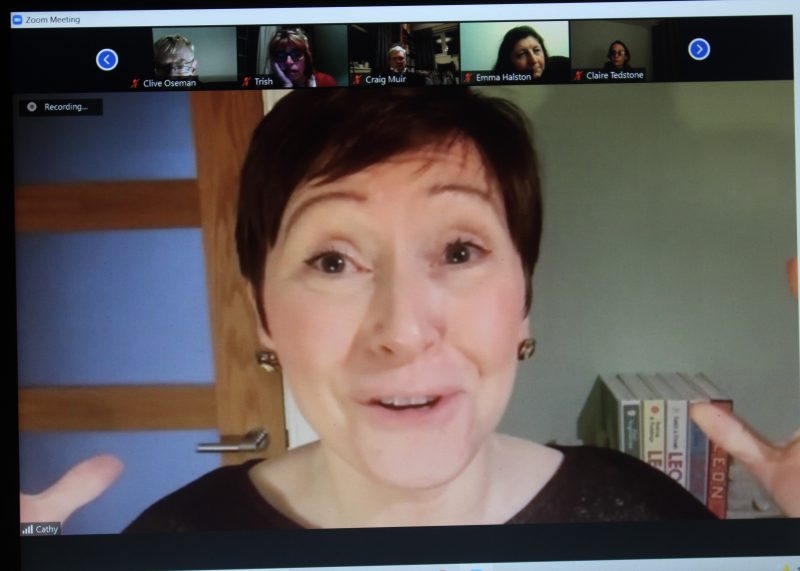
HCE: Would you say there are themes or motifs that you gravitate to in your work?
CC: I focus on the complexities in all of us and connections between us. Everyone has a journey, and while the journey itself may differ from that of others, often the internal struggles are similar. I try to use my own experiences to show that hope and healing are possible.
HCE: We hear you’re currently working on a spoken word show. Are you able to give people a little insight into the premise? Are you planning to tour it?
CC: The show is about a young woman called Dannielle who encounters homelessness as a result of domestic violence at home. It maps her life experiences, relationships and the challenges she faces navigating the world around her and trying to put her life back together. I am still in the editing stages. I would love to tour it a little, but need to be realistic. I am a nurse first and foremost. My time is not flexible, but gosh yes, I would love to take it where I can.
HCE: Some of your poetry deals with your own life experiences in a raw and honest way. Is this an emotionally draining thing to do? What is the top piece of advice you would give other poets for tackling heavy/personal topics?
CC: It is emotional, but not draining. Cleansing maybe. Writing and performing it gives me a chance to take control of the narrative of my own life and reframe it.
For me, it is about changing the pathway of that story in my mind, finding the point where hope lives or could have lived and amplifying that so that it becomes the focus of the story rather than the trauma. Performing or reading this new version over and over seems to readdress the trigger for me and my mind will automatically go to the new narrative when I think of it.
For me, even if I do get upset, I allow it but I remind myself I am no longer in that situation, that this is only memory and has no real power in my life today. We remember funny situations and laugh, and sad situations and become upset. I think that is healthy.
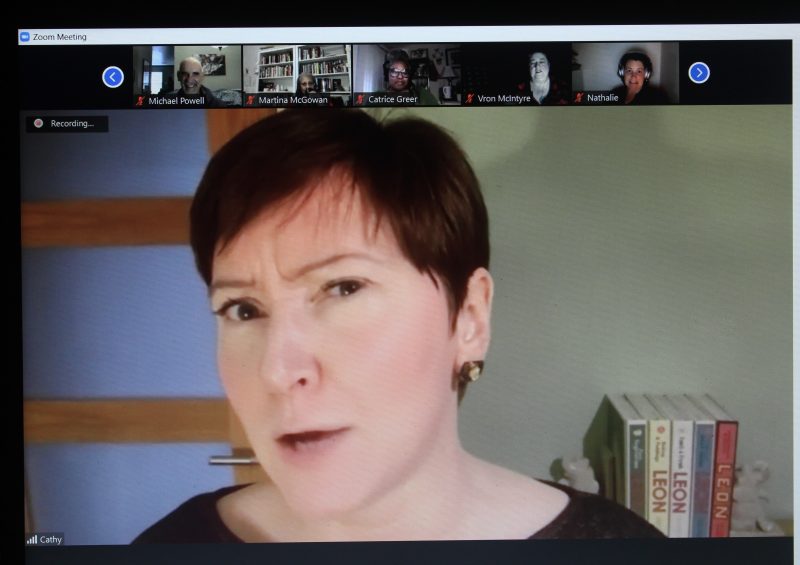
HCE: While your poetry is frequently heartfelt and heart-breaking, it often features moments that raise smiles too – and it was a lovely treat for us at Fire & Dust to experience you being hilarious in ‘Jammy Dodgers’! Do you find humour is an important element when it comes to connecting with audiences?
CC: I am not naturally funny at all. But I do like to put moments of lightness through my work because life is very seldom completely sad. There are moments that surprise us and break up the weight of the poem and I love playing around with that. I hope it allows the reader or listener to sit with the impact of the piece at little easier. “Jammy Dodgers” is my only funny poem, but it is a favourite.
HCE: In your opinion, is Co Down a good place to be a poet/writer/creative? Do you feel nurtured and is there a thriving arts community?
CC: Northern Ireland as a whole is an amazing place to create. I am still discovering what is out there, but have come across so many inspiring poets already who drive me to keep pushing forward. The community has been so supportive. But what has blown me away the past 20 months has been the online community. It has been mind blowing to witness what the poetry and spoken world community has achieved. As the world closed down, poets opened up.
HCE: What type of poetry do you seek out for personal enjoyment? As a reader/listener, when you engage with another poet’s work, what are you hoping to get out of it?
CC: I listen and watch more than read. For me it is about how the poet embodies the poem. It has to make me feel something for me to engage. I love it when I learn something new about the poet, or the world, or life or myself. There are so many amazing poets or performers who do this so well in our community.
HCE: Would you say poets tend to place too much value on being published as their end goal? And for you, is publication important, or do you focus more on other aspects, like growing your reputation as a performer?
CC: I think you have to find what drives you. For some this will mean never putting their work out there at all, for others it is publishing, for others performance. For me, it really is about how the poem makes me feel as I push it through me. The rush of that is so liberating, so transformative at times. So yes I think performance first, but the performance has as much importance for me on a personal level as for the audience.
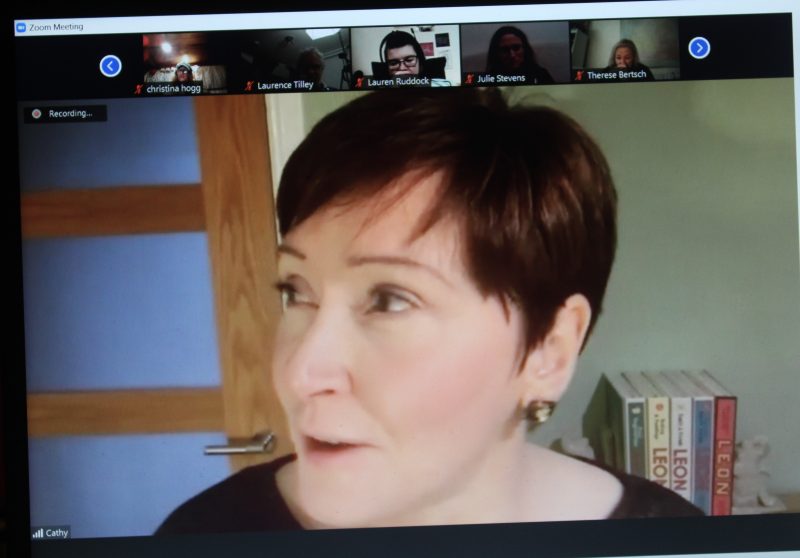
HCE: You’ve engaged enthusiastically with virtual events across the pandemic. What would your top piece of advice be, for poets who used to love open mics but find it a challenge to perform online?
CC: First tip. Take that spot light off for yourself. It is so disconcerting to see your face full screen as you perform. Sadly no advice for those who screen read as I have always done performances from memory. It helps to look straight at camera rather than screen or focus on just one person you know in the audience and imagine performing just for them.
That sea of faces can be overwhelming but the plus for me is the chat box and I think that in the absence of being able to go up to someone after the event and say “hey, I loved what you did”, it is important we use it to lift each other up.
HCE: Since you juggle being a poet alongside being a nurse and a counsellor, have you found it tough writing since the pandemic kicked off, or has it been a source of inspiration?
CC: I have found it so hard to create this last 20 months. It has been my least productive time as a writer. Honestly, sometimes after a shift, there is just nothing left in me and I am mentally, physically and emotionally spent.
I did write one poem about nursing during the pandemic but found that working with Covid up close every day, I actually wanted to write about something else if that makes sense.
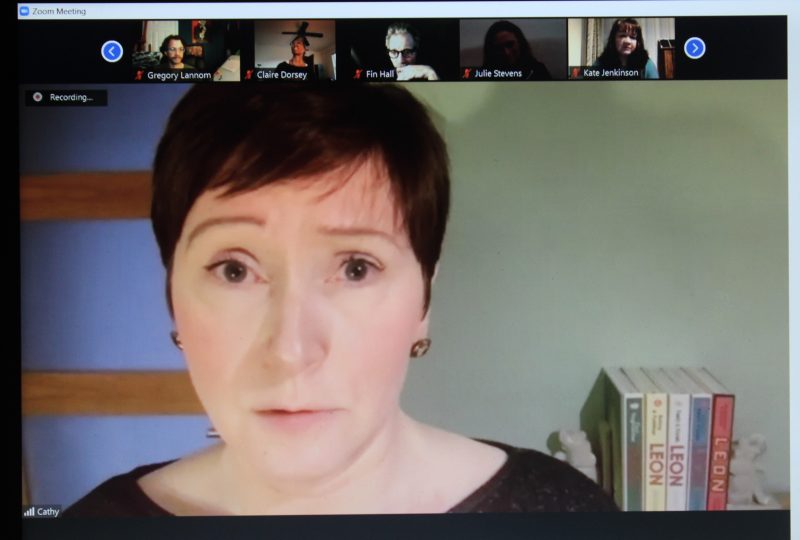
HCE: It’s becoming a slightly better question to ask and answer, compared to earlier in 2021…what is next on the horizon for you? Are you already booked for upcoming performances?
CC: This is difficult to answer. I am a nurse first and foremost. This always limits how far I can push my writing and performing due to shifts and workload. But I do plan to focus on getting the show to as many venues as my life allows next year and have a few places that are ready to have me as soon as I am ready. The good news is that I do intend to take it to England where possible. It is all new to me. I am learning ….fast.
HCE: Anything we didn’t cover that you’d like to share with our readers?
CC: I have been really touched by how the poetry community in the UK has come together and carried each other through this pandemic. Every event has left me inspired, encouraged and feeling connected. I am so grateful for all those who have supported me through this journey of getting my voice out there.
I had so much fun at Fire and Dust. Such a supportive and talented community. Many thanks for having me along, it was really wonderful. x
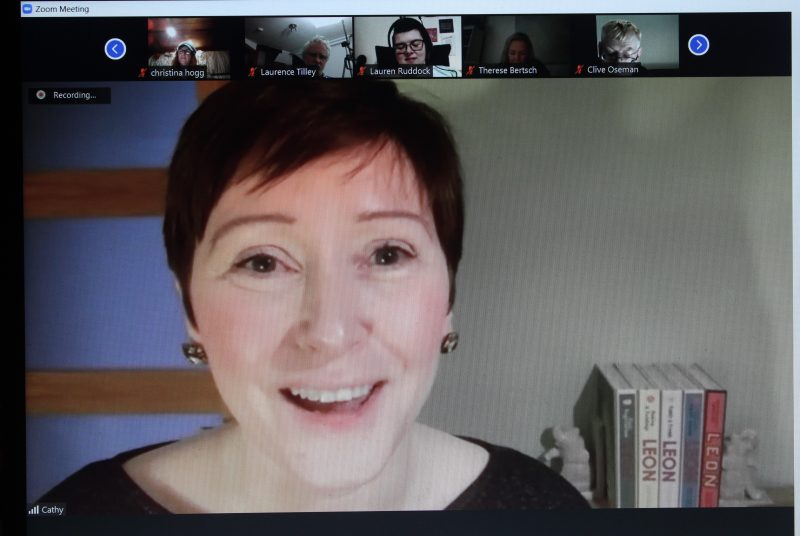
HCE: What’s the best way for people to keep connected or contact you for bookings?
